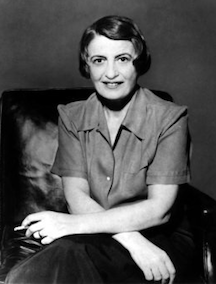By RoseAnn Foster
A strong liberal arts education develops the mind, man’s greatest and most important faculty for achievement. Students whose education familiarizes them with multiple disciplines are more likely to be able to integrate those ideas and build upon them to achieve new innovations.
As Secretary Churchill stated in his latest blog, “Exposure to great theories and new ideas through the arts and sciences expands many of life’s dimensions, including the intellectual and personal. Arts and sciences education equips us for the search for value and meaning. Exploring the issues and ideas inherent in the arts and sciences breaks old boundaries of thought and understanding, stimulates interest in the new and unanticipated, and supports creativity.”
Such an education would be supported by philosopher Ayn Rand, who believed that achievement was the purpose of one’s life and incorporated the importance of the ability to think critically into her work.
According to the Ayn Rand Lexicon, “[A student]… has to be taught to think, to understand, to integrate, to prove. He has to be taught the essentials of the knowledge discovered in the past—and he has to be equipped to acquire further knowledge by his own effort.” A liberal arts education, which incorporates multiple disciplines, cultivates this ability.
Students who have a familiarity with multiple disciplines and a well-rounded education are more able to acquire knowledge on their own, use their knowledge to reach their goals, and think creatively to make new innovations and discoveries and to solve problems. For example, in Ayn Rand’s novel The Fountainhead, the hero, Howard Roark, uses the knowledge he gained while working in the granite quarries, at school, and his own mind to design new building styles. Rand elaborates on the importance of using one’s mind to achieve through her character, Peter Keating, who turns to Roark for help with every difficult problem.
Though Rand’s work often focuses on the achievements of characters within their professional spheres, it is abundantly clear that such achievements would be impossible without the use of a well-developed, well-educated intellect. In fact, in Atlas Shrugged, often cited as Rand’s greatest work, the hero is an inventor, a man who uses his mind to create and who represents progress within society. Likewise, the villains are those unwilling to think for themselves and blindly follow the mandates set up by those in government unable or unwilling to create themselves and thus seek to force others, like the heroes of the story, to do so for them.
Through her novels Ayn Rand supported the development of mind through a liberal arts education. Her heroes have and use the ability to learn and to think for themselves, and are able to solve problems in new ways.
In a Huffington Post article, “The Value of a Liberal Arts Education in Today’s Global Market Place,” from last July, Edward J. Ray wrote, “The ability to quickly assimilate information, analyze what’s needed, and aggregate content for personal or professional use are skills that stem… from liberal arts training and are critical in all aspects of life today. In a country of polarized politics, a liberal education enables critical thinking and the capacity to put tough issues into a larger context. Such graduates will develop skills to help our country implement solutions rather than simply conduct arguments.”
It is precisely for this reason that Ayn Rand would have viewed a Liberal Arts Education as vital training in order to achieve one’s goals.
RoseAnn Foster is a senior at the University of Mississippi majoring in English. The University of Mississippi is home to the Beta of Mississippi Chapter of Phi Beta Kappa.




